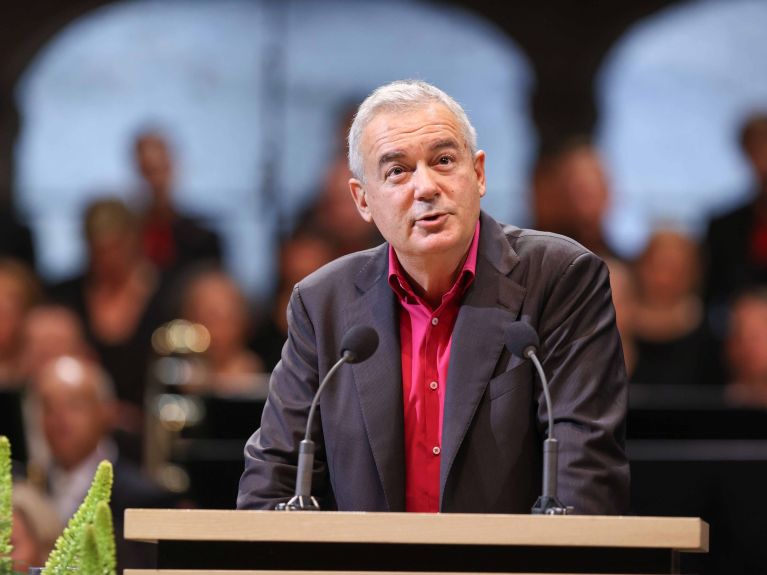“Strengthening democracy across borders”
The author Ilija Trojanow is involved in the “Global Assembly”, which is seeking ideas for strengthening democracy worldwide.

The initiators of the “Global Assembly” firmly believe that the question of democracy and human rights is not limited to nation states. To mark the 175th anniversary of the first German National Assembly, activists from around the world will therefore be meeting at St. Paul’s Church in Frankfurt am Main to discuss what form a grassroots democratic globalisation could take. Following the initial event this year, the discussion about a cosmopolitan democracy is to continue, culminating in an even larger assembly in the spring of 2024. The Bulgarian-born German author Ilija Trojanow is one of the initiators. He will speak on democracy, the composition of the “Global Assembly” and the power of processes.
Mr Trojanow, nation states are described as democracies. What do you mean when you talk about cosmopolitan democracy?
On the one hand, we have the historical perspective stemming from the first democratic parliamentarian assembly that was held in St. Paul’s Church in Germany 175 years ago. In this way of looking at things, the nation state predominates. Today, however, many of the threats we face - such as climate change - can no longer be resolved at the nation-state level. Furthermore, many nation states are ruled at present by authoritarian regimes. At the Global Assembly, we will therefore be looking at how democracy can be strengthened across borders and which new forms of participation and co-determination there could be for all.

What shape might these take?
I cannot say at this early stage. After all, we want the participants in the Global Assembly to develop the ideas themselves. We want to create open structures for discussions. I grew up in Africa, lived in India for a long time and have visited all the continents - and one of the things that has amazed me time and again is to discover just how differently people view situations and formulate their demands. No matter how educated or attentive we are: the circumstances of our own lives limit our perception. That is why we want to give different people from all over the world the opportunity to have their say in the Global Assemblies.
How is the Global Assembly composed?
First, I’d like to emphasise that the participants selected cannot be representative of all eight billion people in the world. We were looking above all for participants who not only have a strong basis in theory but also actively put ideas into practice. They should know which hardships and desires preoccupy people on the ground.
What form is the discussion process to take until it culminates in 2024?
I believe that we focus too often on the final outcome. And yet the process itself is extremely instructive and important. And we do not know in advance how it will end. We want to make it possible for people to treat one another with respect and dignity on an equal footing.
To what extent will the wider public be able to take part in this process?
This is mainly a job for the so-called chroniclers. Well-known authors will sit in on the discussions and write about them. In this way, they will provide information on the one hand for the general public , while on the other their articles are intended to stimulate further discussions, like stones thrown into water.
What used to be considered utopian is today an integral part of a fair and democratic order.
The idea for the “Global Assembly” originated mainly from the initiative “The Utopian Space” in Frankfurt. Why do we need utopias?
I believe that most sociopolitical accomplishments began as a utopian idea. Let me provide an example to explain what I mean: The abolishment of slavery began in Great Britain in response to demands from the small community of the Quakers. Over the course of 50 years, a powerful grassroots movement emerged. Many women were active in this movement, women who gradually began fighting for another utopia: equal rights for women. Thus the anti-slavery movement evolved into a movement that 50 years later succeeded in attaining universal suffrage for women.
To put it another way: If we look back at history, we often realise: What used to be considered utopian is today an integral part of a fair and democratic order. Utopias conceive of “realms of possibility” that later generations will enter.
